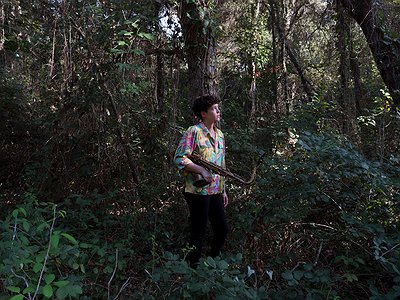Name: Laura Agnusdei
Nationality: Italian
Occupation: Electroacoustic composer, saxophonist
Current Release: Laurisilva on The Wormhole
Recommendations: A brilliant book about some of the topics we tackled in this interview is “Presets, digital shortcuts to sounds”, a series of Interviews lead by Stefan Goldmann, published by The Wormhole. A nice piece of music I listened to recently digging into Lithuanian music is Bronius Kutavičius - Paskutinės Pagonių Apeigos.
If you enjoyed this interview with Laura Agnusdei and would like to stay up to date with her work, visit her website which also includes links to all her social media accounts.
When did you start writing/producing music - and what or who were your early passions and influences? What what is about music and/or sound that drew you to it?
I've been playing since I was a kid, I started with guitar because of my mom, she wanted me to play an instrument. But it's when I started playing saxophone that things became personal and serious (I was 18), and to draw me into it was its unique timbre, so flexible, so powerful.
When I was a teenager I had several bands, and composing was mostly a collective practice for me. I started producing my own music in 2014, when all my bands felt apart and also for personal reasons I decided that it was time for me to do something that was exclusively mine.
For most artists, originality is first preceded by a phase of learning and, often, emulating others. What was this like for you? How would you describe your own development as an artist and the transition towards your own voice? What is the the relationship between copying, learning and your own creativity?
I consider myself as a very young composer, not because of my age, but because I started to build a self-consciousness and to reflect deeply about what I am doing just recently, mainly thanks to my studies at The Institute of Sonology. Before, making music for me was a practice based on intuition and feelings. Therefore, I never explicitly engaged in copying anyone, maybe because I had enough rules while I was studying as a performer of classical music, doing music with my friends was instead my “safe space” where I could be just myself.
In my way of thinking copying is something that I do in a passive way, It just happens that you can hear the influences of artists I admire in my music, but it's not intended. Learning is a different process, there is a more direct link between learning a new technique and putting it into practice in a new track for example. You can immediately spot it and it's less subtle.
What were your main compositional- and production-challenges in the beginning and how have they changed over time?
When you are composing and playing live for a while you start to have a “repertoire” and the biggest challenge for me is to not repeat myself, to always try out new things. When you are starting you don't have this problem and it's just about discovering what you really like to do. The thing I still struggle with the most is how to develop a piece to its full potential. It's not a problem for me to chose sounds to work with, or to find an initial idea, but it's harder to understand how these single elements could evolve through time and where the piece is going to end.
What was your first studio like? How and for what reasons has your set-up evolved over the years and what are currently some of the most important pieces of gear for you?
My first (and last) studio was my bedroom, two monitor speakers, a desk, messy cables in a closet, random instruments in the wardrobe, my sax on the stand.The most important piece of gear is still my sax, it's what distinguishes me and it's “my voice” I would say. My set up evolved from just sax, laptop and one midi controller, to a slightly bigger one, adding a synth Jupiter-08 (the boutique version) and a few other things. The reason is that even if I like working with Ableton Live, because of its wide possibilities, I am always looking to “play” more in the conventional sense of having an instrument in front of me.
Now I am in a moment in which I really feel the need for a big shift in my set up, mainly because I'd like to reduce the amount of pre-recorded samples that I use and move from a more flexible way of producing and manipulating sounds in real time. But I know that to reconfigure everything will take time, that's why meanwhile I am rearranging my repertoire also for a live band.
How do you make use of technology? In terms of the feedback mechanism between technology and creativity, what do humans excel at, what do machines excel at?
Humans have emotions, machines don't. Yes, machines are smart, that's cool and they will become smarter and smarter, but they still don't cry. Any tool brings a story with it, a network of relationships and references, what Helmut Lachenmann was calling “ The aura” of a sound. That's somehow similar to a person, which has its own story that brings in the room when you are playing together. But humans made machines' history, without fingers pressing bottoms there are no sounds.
So, in the end, my way of looking at technology is still very anthropocentric, I still believe that machines are nothing without someone who can use them. Even if they have their own logic that then shapes your way of music making, it's the human ear which decides whether a sound is “just a sound” or it's “music”, it's a human that puts meaning on the product of a machine. For me, technology is a way of manipulating timbre, the musical parameter I am most interested in and a way to assemble different sounds to create a track.
Production tools, from instruments to complex software environments, contribute to the compositional process. How does this manifest itself in your work? Can you describe the co-authorship between yourself and your tools?
The tools you are using suggest to you short-cuts and strategies to manage your material. Now for example I am very tired of looping, a practice that has been very present in my music so far. To loop sounds and to control the layering of different loops was a strategy suggested to me by Ableton Live. It's a combination of what you are asking to the software (“hey I want to build a solo live set, fuck bands!”) and what the software suggests to you.
It's in the natural misunderstanding that happens between a human and a machine, that you find the music. The point is to ask new questions to your tools, only that can create new co-authorship. It's the same with the saxophone (another machine indeed). There are moments in which he is not giving you anything new. But that's just because you just didn't ask a new question.
Collaborations can take on many forms. What role do they play in your approach and what are your preferred ways of engaging with other creatives through, for example, file sharing, jamming or just talking about ideas?
As an instrumentalist mainly my collaborations include playing sax on other people's tracks or jamming. I did that a lot and of course, I enjoy it but I also appreciate it when people ask me to do something else.
Recently the most interesting collaborations I had weren't with musicians. For example, collaborating with the archive Home Movies in Bologna I contributed to an exhibition about Jonas Mekas curating a selection of tracks and doing the sound design of an installation. For that, with the curators Paolo and Giulia, we spoke a lot about the work and life of J.M. and it was a great opportunity to learn something new.
I also did a lot of live scoring projects and I see that as a collaboration, doing music for images is always a way to engage a dialogue with who shot the material, did the montage and so on.
Could you take us through a day in your life, from a possible morning routine through to your work? Do you have a fixed schedule? How do music and other aspects of your life feed back into each other - do you separate them or instead try to make them blend seamlessly?
Well, I usually work on my musical projects in the morning and in the afternoon till maximum 11 pm, when necessary. I don't like to make music at night or after dinner (I am talking about Italian dinner time, so it can be also late). I like the feeling of relaxing at night after a busy day. That's my plan in days when I don't have other “extra-musical” job to do.
Fortunately, in the last year my other jobs where mainly during lunchtime and it was nice cause it's a good way to have a break and refresh your brain between two sessions of work. I don't have a fixed schedule cause it really depends on which project I have to focus on at the moment.
My mood really affects my productivity, but it's also the other way around: when I am satisfied with my music I think I am a better person with friends, family and in everything else I do. The best is when playing gives me a sense of joy, fullness or excitement. When it works that way, I see how that energy flows into even the smaller activities of my life, from washing dishes to dogsitting.



